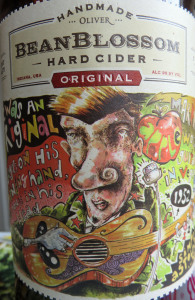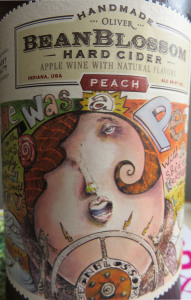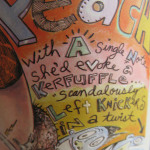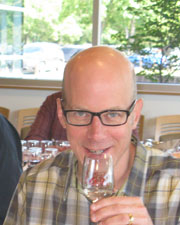Seeing Glass at BeanBlossom Cider
Back in the summer of ’11, one of my first “big” Midwest Wine Press interviews was with Bill Oliver of Oliver Winery. I was excited and a little nervous to be interviewing the biggest winery owner in the Midwest. But to my surprise, Bill did not want to talk about wine. He wanted to talk about his new hard ciders.
 Oliver was one of the first wineries in the Midwest to produce hard cider. During 2011, total U.S. cider sales were only around 5 million cases per year. Last year, the Woodchuck cider brand alone sold over 2.5 million cases. Now I understand why Bill Oliver was so excited about cider back in ’11. He knew cider was about to take off.
Oliver was one of the first wineries in the Midwest to produce hard cider. During 2011, total U.S. cider sales were only around 5 million cases per year. Last year, the Woodchuck cider brand alone sold over 2.5 million cases. Now I understand why Bill Oliver was so excited about cider back in ’11. He knew cider was about to take off.
Around that time, Oliver contracted with the Ball Container Corporation to purchase 1.3. million aluminum cans for the BeanBlossom hard cider line. Soon after Oliver started using the Ball cans, they received reports of hydrogen sulfide (rotten egg) odors coming from the containers.
According to a lawsuit filed at the end of 2013, Oliver alleges that Ball misrepresented that hard cider was compatible with the aluminum cans. According to Oliver, the packaging company tested the cans before the order was signed and gave the green light. The matter is set to go to trial, according to the latest information we could find.
Bill Oliver said he could not discuss the legal proceedings, he was happy to talk about his “new” ciders, including how happy he is with the new glass bottles that hold BeanBlossom cider. “We’re now getting glass bottles from Owens Illinois and I couldn’t be happier with how the label and the packaging has turned out,” Oliver said.
The cider is now in a 750 ml bottle, which is the same volume as a standard wine bottle. The brown BeanBlossom Hard Cider bottle is stouter than a wine bottle and also has a metal crown cork. If the label art looks familiar, that’s because Oliver hired acclaimed Indiana artist Kevin Pope. Pope, who is from Carmel (the one by the interstate, not the sea) is internationally known for his work in Mad Magazine and a Pepsi ad that ran during the Superbowl.
Unlike many hard ciders that project a craft beer image, the design of the BeanBlossom Cider bottle and label is more like a fun, premium wine. (Think Boony Doon or Blasted Church.) According to Oliver, that’s not by accident. BeanBlossom is trying to appeal to winedrinkers who have a more nuanced palette.
BeanBlossom Cider sells for $10 a bottle, which is at the lower end of the range for mid priced wines. Few consumers will pay $10 for a bottle of beer, but consumers tend to equate premium hard cider with wine more than beer. Considering cider costs more to produce than wine, producers like Oliver need to find a price point that works from a business standpoint. Oliver invested over $1 million in a filling machine for the hard cider, proof that he’s committed to hard cider for the long haul.
Tasting Oliver cider side by side with Woodchuck, the difference is clear. BeanBlossom cider tastes more like apples, or at least what apples used to taste like. “Modern” apple breeding, which stresses color over flavor, has reduced the most popular grocery store apples to sugary mush. (We mean you, Mr. Red Delicious.)
BeamBlossom cider has tannins, but apple tannins have a different mouthfeel than grape tannins. Apple astringency in well made hard cider is more like Pinot Noir than Cab Sauv. In contrast, the “grocery store” hard ciders nary have any mouthfeel at all.
BeanBloossom Cider is made from Michigan apples and some Indiana apples, which are harder to find. “There’s more depth of flavor from the Midwest apples,” Oliver said. “The local apples are not as perfect as Washington apples, which are a little too “clean” for cider, in my opinion.”
Oliver acknowledges that hard cider has become associated with craft brewing, and in so doing has become a fashionable beverage. Oliver feels that cider making is a natural extension of winemaking and that winemakers should not be so sheepish about making premium hard ciders.
“Who can make better hard cider, a brewery or a winery?” Oliver asked. “They (brewers) don’t have the experience working with fruit that winemakers do. A brewer ferments barely. Winemakers work with fruit every day.”
 Oliver approaches cider making like white wine making. “Keep the fruit cold and away from oxygen as much as possible.” he said. “Arrest the fermentation to capture the natural sugar and then get it in the bottle fast.”
Oliver approaches cider making like white wine making. “Keep the fruit cold and away from oxygen as much as possible.” he said. “Arrest the fermentation to capture the natural sugar and then get it in the bottle fast.”
Sounding like a minimalist winemaker, Oliver said, “We are not back adding flavor. Our cider is straight up apples.”
Oliver said he plans to produce 7,000 cases a year of hard cider in 2015. Over time, Oliver said production could increase to 20,000 cases, but he does not want to move from handmade to mass produced cider.




Great article – definitely makes me want to find some being retailed locally ASAP. In case anyone else is also interested I found this link on their website:
http://www.oliverwinery.com/find
I’m also curious about a couple points in the article.
1. “We’re not adding any flavor…our flavor is straight from apples.” I was looking at the Peach Hard Cider and the Label indicates that this is an Apple Wine with Natural Flavor. What does “natural” mean? A naturally derived flavor (extract, concentrate, etc) made exclusively from peaches, or that only actual peaches have been used in the process?
2. “Arrest the fermentation to capture the natural sugar…” I was wondering if this was done by dosing the cider with Sulfites or if a different method was being employed, and if so, what?